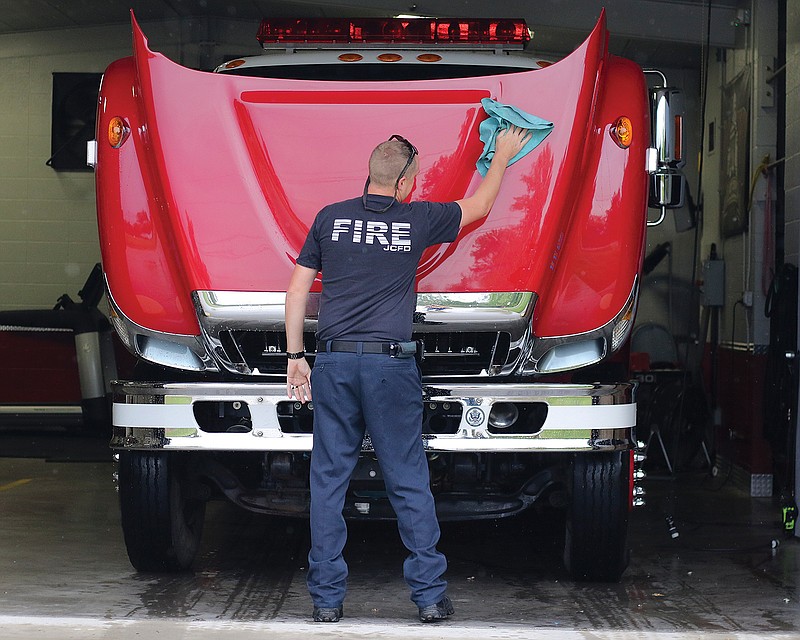Competitive wages and updated equipment.
Those are the goals of a proposed quarter-cent sales tax for Jefferson City's public safety teams that will be on the Nov. 2 ballot.
The tax needs a simple majority to pass. If passed, collections would start April 1 and would bring in $2.8 million annually.
Jeremy Bowman, president of the Fraternal Order of Police, said funds from the tax would help make wages more competitive and attain new equipment such as body cameras.
"The goals of the tax are competitive pay, competitive wages for recruitment and retention of officers," he said. "We recognize the technology world we live in, body cameras are essential. We support body cameras."
James Noah, vice president of the Local 671 union, said his focus is for competitive wages at the fire department.
"We are quickly becoming a very young department," he said. "We've had a lot of retirement turnover, so we're losing a lot of experience, and we quickly found that we were a very non-progressive department (for salaries). One thing that has had a significant impact on is our recruitment."
Fire Chief Matt Schofield is seeking an additional fire house, which would mean more equipment and staff, and the sales tax could go toward equipment and staff for the house if passed, Noah said. While there are potential equipment and facility needs, firefighters are focused on adjusting the pay scale, he said.
City Attorney Ryan Moehlman said money from the tax would go into its own account - earmarked for the police and fire departments - and the City Council would decide how it is spent.
According to Missouri law, proceeds from a city's public safety sales tax can be used for expenses "including but not limited to expenditures on equipment, city employee salaries and benefits, and facilities for police, fire and emergency medical providers."
Carlos Graham, co-chairman for the JC Citizens for Public Safety and former Ward 4 councilman, said the tax funds would be on top of funding that public safety already receives through the general fund and Capital Improvement Sales Tax money.
In the 2022-approved budget, the JC Police Department will receive $9,964,549 and the JC Fire Department will receive $8,195,516.
Over the next five years, the two departments combined will receive $5.6 million from the city's half-cent Capital Improvements Sales Tax H, which was extended in August.
"This tax is not to supplant other budget line items," Graham said. "This is strictly for public safety use."
Jason Ambler, vice president of the Fraternal Order of Police, said he and Bowman have attended civic organization meetings to discuss the potential tax and have mostly received positive feedback.
Graham said he's talking to people about the tax as well and trying to answer as many questions about it as he can. One of the most common questions he gets is why the tax doesn't have a sunset.
When the council discussed proposing the tax in April, members talked about a potential sunset, which would mean the tax would go before the voters every certain number of years to be extended.
However, when the council put the issue on the November ballot, it chose to omit a sunset.
Graham, who was about to end his last term on the council at the time, said the omission of a sunset goes back to where the funding would go.
"You're dealing with personnel and salaries," he said. "I don't know of any tax out there strictly tied to salaries where there's a sunset. As you can imagine, if a sunset was put on there and for some reason down the line it didn't pass, it's going to be more chaotic than anything."
The tax is the only item on the November ballot, but Bowman said he isn't concerned about voter turnout because he's confident in the campaign plan.
"We've been involved in the community and making more people aware, and it's the snowball effect," he said. "People learn the troubles we're facing, and the fixes that can come with this tax. They tell their friends, who tell their friends, who tell their friends. I think that will continue to grow a supportive group."
While the tax would have an immediate impact on funding for the departments, Ambler said, it goes more into the future.
"We're not planning for the present with this," Ambler said. "We are looking at long-term investment in our community. Having been born and raised here, this is my home. I have a single digit number of years left until retirement. I'm paving the way for the officers that are taking my spot. It's an investment in the community."

